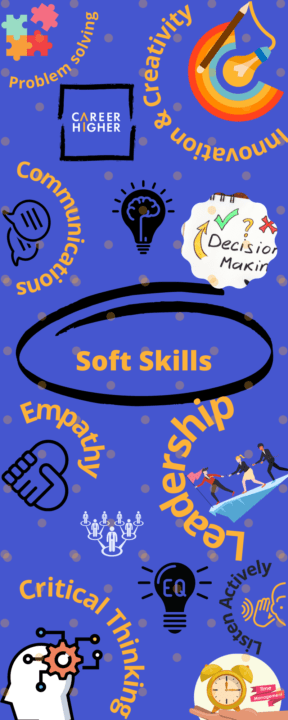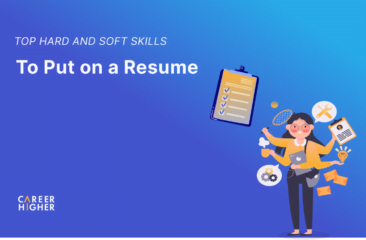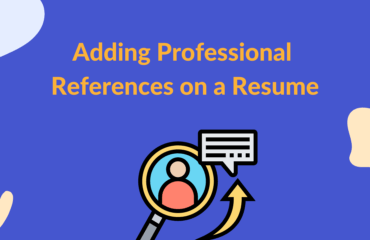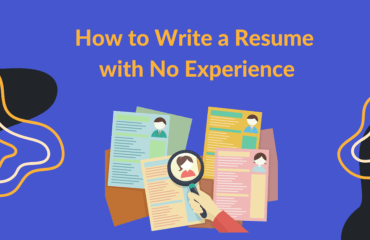Table of Contents
According to research by McKinsey Global Institute, about half of current work activities have the potential to become automated by 2055. However, the non-technical skills, i.e. soft skills, are much harder to replicate. Therefore, employers look for soft skills in resumes as these can be transferred irrespective of the function or industry.
According to a report by Deloitte, hiring employees with strong soft skills can increase the revenue by more than $90,000. However, HR professionals have reported difficulties recruiting candidates with the necessary soft skills for an automated world. Based on their responses, the top three areas of missing soft skills are:
- Problem-solving, critical thinking, innovation, and creativity
- Ability to deal with complexity and ambiguity
- Communications
Thus, we have created a list of the top 8 soft skills that can add immense value to your resume when aligned with your target job. Let’s see below.
1) Problem-solving
Problem-solving skill is one of the topmost skills that experts believe employees should have. With the growing technology, businesses have to face various issues that need to be dealt with correctly. Problem-solving skills allow professionals to find, comprehend, and analyze the root cause of a problem, identify alternatives, and apply the appropriate course of action for timely resolution. An effective way to reflect problem-solving skills in your resume is:
“Administered the governance of the KM Center for the company; conducted high-quality research and analyses and introduced new tools, policies, and procedures; enhanced the overall productivity and decreased search time of queries”
2) Critical Thinking
Recruiters look for professionals who have the capability to defy the statement “That’s the way we have always done things”. Adding critical thinking skills to your resume reflects this potential, making you a favorable candidate. Critical thinking is the ability to think and understand clearly and act rationally based on available evidence. It helps managers make sensible business decisions, positively impacting profitability and growth. This is how you can add critical thinking skills to your resume:
“Devised strategies to improve customer engagement; ran a digital customer engagement program and personalized digital messaging; increased customer satisfaction by 27% and uplifted customer renewals by 52%”
3) Innovation and creativity
Creativity and innovation skills are likely to be essential for most of the jobs created in the next 10 years. This enhances their value on your resume. These skills demonstrate your ability to solve complex problems that require non-standard, versatile solutions. Employees who have good basic competencies along with strong creativity and innovation skills are likely to be well equipped for the future. An example of creativity skill on your resume is:
“Proven track record of successfully delivering consistent and relevant brand messaging through creative storytelling, globally and locally.”
4) Communication
Communication skills are always high in demand by employers. Having these on your resume demonstrates your ability to work effectively with a broad range of people while influencing, mentoring, and coaching each other. Communicating became even more important during the pandemic when everyone moved online. Thus, employers emphasize strong communication skills as the need to communicate effectively during a crisis is at its peak. An impactful way of adding strong communication skills to your resume is:
“Equipped with excellent communication and interpersonal skills to effectively facilitate knowledge transfer and training to diverse audiences of varying technical expertise”
5) Leadership
As a mid-career professional, recruiters and hiring managers look for leadership skills in your resume. Due to rapid technological advancements, businesses are required to change and adapt to the latest trends. Such phases need to be governed by the best leaders to ensure efficiency, productivity, and profitability. Some skills you can add to demonstrate strong leadership are decisiveness, integrity, and relationship building, among others.
6) Time Management
Time management skills allow you to prioritize and finish tasks based on urgency. Adding these to your resume will reflect your ability to meet deadlines and effectively manage multiple projects and meet the team and organizational goals. An example of time management skill on your resume is:
“Guided cross-functional team members on the timely execution of deliverables; completed the project within the established timeline of 7 months”
7) Decision making
The share of jobs requiring employees to make good decisions rose from 6% in 1964 to 34% in 2018. Employers are always on the lookout for candidates with exceptional decision-making skills to enhance the outcome of business decisions. An effective way of adding decision making to your resume is:
“Spearheaded cross-departmental meetings to understand key performance indicators and make actionable decisions”
8) Empathy
Empathy is considered to be a crucial skill for building and maintaining relationships in the workplace. When leading large teams, it is essential to manage people efficiently while being open to understanding their issues. Hence, employers look for candidates with high levels of empathy. It is the ability to understand what others feel and make decisions based on that. Essentially, it is putting yourself in someone else’s shoes and feeling what they must be feeling. An effective way to add it to your resume is:
“A people person with a high level of empathy, capable of managing international teams effectively while providing mentorship for high performance and wellbeing”
Other top soft skills to add to your resume
Some other top soft skills that add value to your resume are:
- Networking
- Flexibility
- Teamwork
- Conflict Management
- Attention to detail
- Growth Mindset
- Adaptability
- Emotional Intelligence
- Active Listening
- Organizational

Top tips on including soft skills in your resume
1) Add examples
Whenever you add a soft skill to your resume, make sure to add some real-life examples to enhance credibility. It demonstrates your effort in adding rational content to your resume instead of simply listing general skills found on the internet. These can be added to any part of your resume, including your experience and summary section.
2) Align it with your target job
We strongly recommend adding soft skills based on your target jobs. To do this, you can simply go through the job description to identify the most relevant keywords. Once identified, place them in your resume, complementing your job experience.
3) Add the impact of your soft skills
The impact your soft skills made on the organization and people around you is crucial to add. It allows recruiters and hiring managers to understand the value you can bring to their organization. Adding numbers to reflect the impact is always a great idea!
How to enhance soft skills
We understand that not all professionals excel at soft skills, and you may be one of them. Nonetheless, you can always enhance these skills, increasing your chances of landing your dream job. If you are wondering how you can do this, let us explore some ways in this section.
1) Being self-aware & reflective
The first step towards improving your soft skills is having an understanding of your areas of improvement. Being self-aware and reflective allows you to evaluate your current skills and identify areas you need to work on. At any stage in your career, self-awareness and reflection skills are a must-have.
2) Having a growth mindset
Another crucial factor is your ability to learn and grow. A growth mindset allows you to learn from your surroundings, helping you thrive during challenging situations. A growth mindset is key to developing yourself professionally and personally. It is your willingness to change and enhance your areas of improvement.
3) Turning to academic resources
Turning to books, blogs, and MOOCs is another path to enhance your soft skills. Whether it is your communication or leadership skills, you can always find resources to read about them, understand them, and learn from them. As mid-career professionals, some resources that you can use are:
- SOFT SKILLS for a BIG IMPACT – a book by Renu Shorey
- Dare to Lead: Brave Work. Tough Conversations. Whole Hearts. – a book by Brene Brown
- Soft skills: what they are and how to develop them – online course options by FutureLearn
- Improve your soft skills – digital resources by Google
4) Seek feedback
Feedback is another important aspect that can help you reach your goals. Seeking feedback on your skills from colleagues, career strategists, skill coaches, and organizational mentors is an excellent way to learn about your areas of strength and development and work on improving your skills. Keeping an open mind to recommendations or advice is vital.
5) Practice
Once you have identified the skills you want to develop and how to do it, you are left with- practice, practice, and practice. For example, if you want to enhance your communication skills, speak and practice with a friend. You can also make a presentation or carry out a mock interview with them. When sitting with a group of colleagues, take part in conversations. There are multiple ways of enhancing your soft skills. All you need to do is to take some time out and work on it. As it is well said, “Practice is a means of inviting the perfection desired”.
There is no doubt that soft skills are valued higher than hard skills. In most cases, technical skills can be taught. This is why a recruiter or a hiring manager looks for soft skills in your resume. It is crucial to have a strong command over your soft skills and reflect them in your resume too. If you are great at your skills but are struggling to add them to your resume, contact us. We would be more than happy to help you create a resume that reflects your worth!











